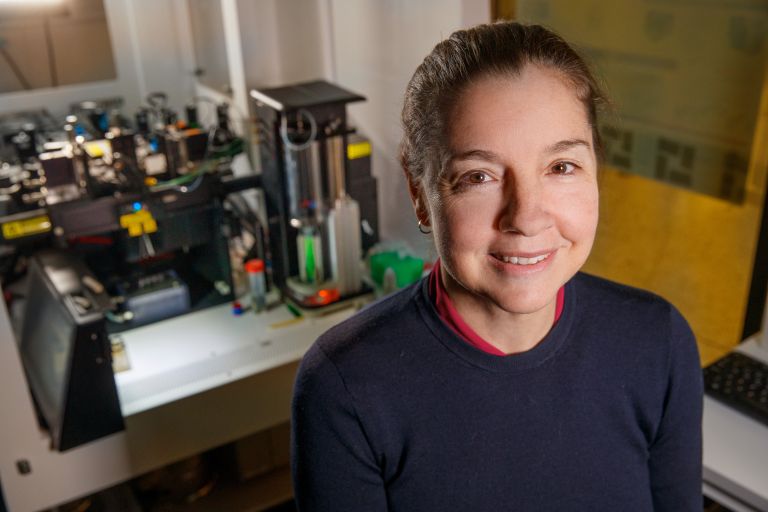
Kirsty Spalding
Professor of Fat Cell Biology
Wallenberg Scholar
Institution:
Karolinska Institutet
Research field:
How certain types of fat cell form and are metabolized


Wallenberg Scholar
Institution:
Karolinska Institutet
Research field:
How certain types of fat cell form and are metabolized
Previous research has shown that obesity is linked both to an increased risk of cancer and to poorer survival after cancer treatment. Yet public awareness of the link between obesity and cancer is relatively low.
"As a researcher, it's clear to me that there is a well-documented link between obesity and increased cancer risk, as well as outcomes after treatment. However, this connection is not always fully recognized or prioritized in public awareness or clinical practice, which can mean that opportunities for early intervention or tailored care are sometimes missed," says Spalding, a professor of adipocyte biology.”
Spalding began her research career in neuroscience. As a postdoc, she worked with Jonas Frisén to develop a method of demonstrating that some neurons in the brain regenerate throughout life. This continues to be a highly contentious claim, so her success has made important contributions to the field.
When she later realized how little was known about fat cells and their regeneration, it sparked her curiosity. She used the same method to study fat cells, enabling her to establish that the body can also regenerate these cells. About ten percent of our fat cells are regenerated each year, during which time we lose about the same number.
“I was surprised how little we knew about fat cells and our ability to regenerate them. Initially, it led to a minor side project, but fat cells are now the main focus of my research,” says Spalding.
She now wants to clarify the connection between fat cells and cancer. She is concentrating on cells that have entered a stage of ageing known as senescence.
Senescence is a specific state in which cells neither die nor continue to divide. Instead, they start secreting inflammatory substances that can impact neighboring cells and nearby tissues. Much focus is on the pathological aspects of senescent cells, with multiple studies and clinical trials focusing on the targeted removal of such cells.
But when Spalding's research group took a closer look at how fat cells impact cancer tumors, they were surprised by their findings.
“The conventional wisdom was that everything related to senescence was bad. But our data shows something else, and even more interesting. We can demonstrate that senescent fat cells can also protect against tumor growth,” she says.
The discovery prompted the research team to shift their perspective. Instead of identifying what is harmful about senescent cells, they are trying to pinpoint what it is about fat cells that can help combat tumors. A better understanding of the beneficial traits of senescent fat cells could pave the way for more precise treatment methods and therapeutics.
What drives me is the possibility of uncovering mechanisms that could lead to new treatment strategies for cancer patients. Obesity remains an under-recognized factor in cancer risk and outcomes - both in healthcare and research - despite mounting evidence. It’s a complex field with many unanswered questions, but also significant potential for clinical impact.
“If we can understand what is good about senescent fat cells and develop new treatments around that, we may be able to exploit their beneficial properties in new cancer treatments.”
The researchers are using biopsies from patients undergoing cancer treatment at Karolinska University Hospital, as well as from patients being treated for different illnesses at Ersta and Danderyd hospitals. Fat cells are then isolated out from the biopsies and senescent cells identified. The team then uses analytical methods such as immunocytochemistry, proteomics and single-cell RNA sequencing to map the proteins and molecules secreted by the cells.
One part of the research entails exposing cancer cells in the lab to these various substances to investigate how they impact tumor growth.
“One thing we hope to discover is how senescent fat cells in breast tissue influence the aggressiveness of breast cancer.”
Collaboration with the healthcare sector is key to the research. In addition to tissue biopsies, it gives the researchers access to blood plasma from patients, which can provide further information.
So far, the team has built a biobank containing cells from approximately 2,000 patients. But working with fat cells is no easy task. They are filled with fat, float and are as fragile as inflated balloons.
“These cells float in all liquids, burst very easily, and are enormous, which means they cannot be examined using our usual research platforms. One of our greatest strengths is that we have developed a unique toolbox specifically for use on fat cells.”
Fat cells pose so many challenges that Spalding advises new team members to try a few days in the lab before deciding whether to join the team.
“They are truly terrible. My advice is to first talk to everyone in the team and spend some time handling the cells before deciding to work with them. Problem solving and patience are key traits for success when working with adult fat cells”
Another strand of her research is investigating whether fat cells are impacted by cancer treatments at an early age. Many more children survive cancer these days, however a large proportion of survivors will go on to develop metabolic disease as adults.
“We want to find out whether radiotherapy or chemotherapy negatively impact the functions of fat cells. We know that the treatments affect cell DNA, but how this impacts on fat cell function and the long-term consequences of this, is not known.”
Text Magnus Trogen Pahlén
Translation Maxwell Arding
Photo Magnus Bergström